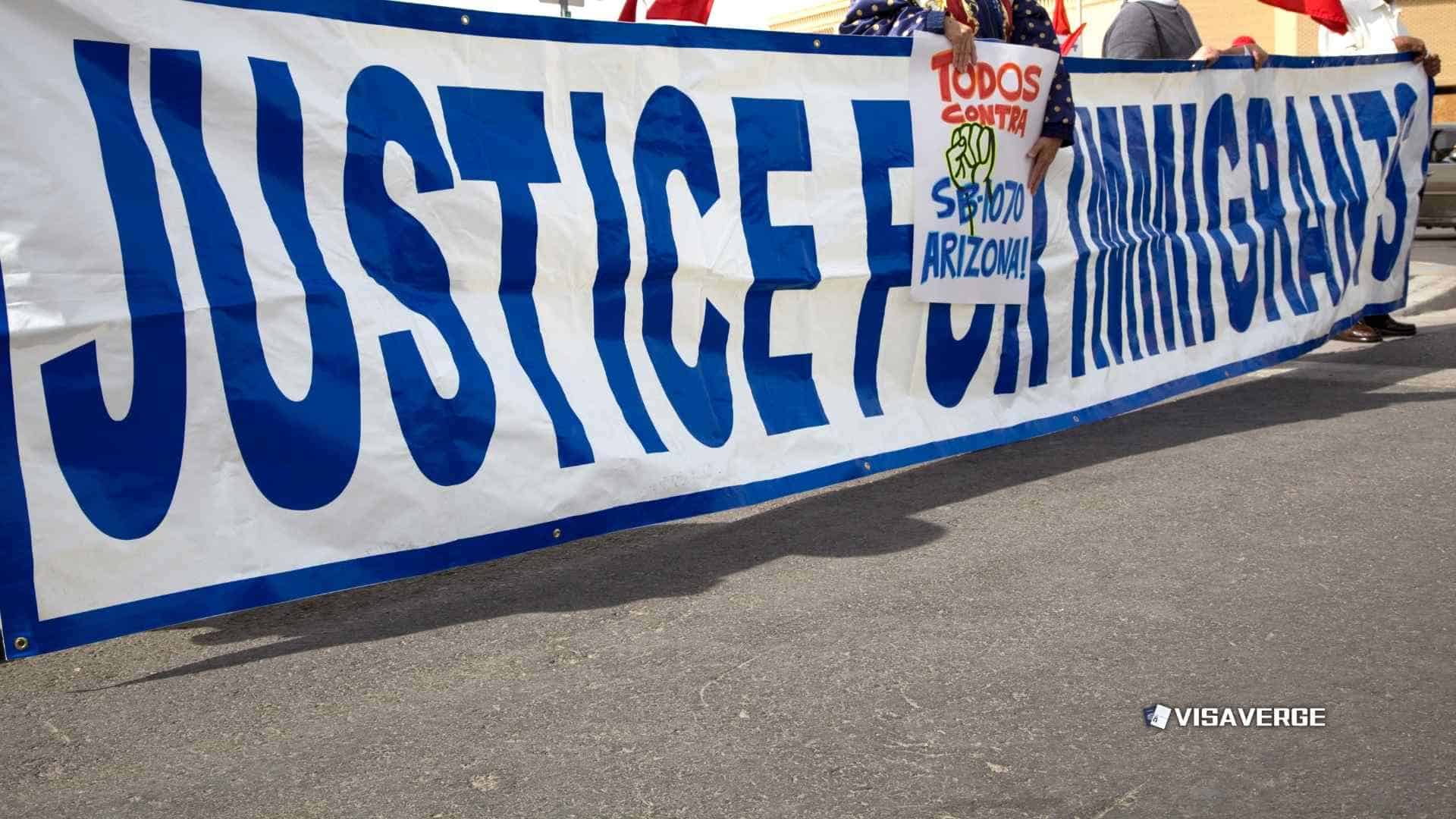Key Takeaways
• ICE arrests in North Carolina increased 160% in 2025, with 1,600 detainees statewide since January.
• Charlotte accounts for 25% of state arrests; over 400 people arrested there in May 2025 alone.
• Federal mandate requires ICE to arrest 3,000 immigrants daily, targeting those with detainers or criminal records.
Federal immigration enforcement has surged in Charlotte, North Carolina, as ICE (Immigration and Customs Enforcement) arrests have spiked dramatically since the start of President Trump’s second term. The city’s immigrant communities and businesses now face daily fear, economic hardship, and growing social tension as a result of these operations.
A 160% increase in ICE arrests across North Carolina has been reported as of July 2025, with nearly 1,600 people arrested statewide since January. About 25% of these arrests—roughly 400 people—have taken place in the Charlotte region alone. The most significant spike occurred in May, when over 400 individuals were detained statewide during a major operation in Charlotte. This sharp rise in enforcement is part of a broader federal mandate requiring ICE to arrest 3,000 immigrants per day nationwide, a target that agents are actively working to meet.

How ICE Raids Unfold in Charlotte
The recent wave of ICE activity in Charlotte follows a clear pattern:
- Target Identification: ICE agents create lists of individuals with outstanding detainers, prior deportation orders, or criminal records.
- Operation Execution: Raids take place at homes, workplaces, and public spaces, often with help from the FBI, U.S. Marshals, and ATF.
- Detention: People are detained during daily routines, such as commuting, working, or dropping off children at school.
- Transfer: Detainees may be held locally or moved to out-of-state detention centers, making it hard for families to stay in contact.
- Legal Proceedings: Many face removal (deportation) proceedings, but access to legal help is limited due to the high number of cases and the distance from home.
- Deportation: Those without legal representation or with prior removal orders are often deported within weeks.
During a single week in March 2025, ICE and federal partners arrested 24 individuals in Charlotte. Charges included aggravated felonies, weapons offenses, gang affiliations, and property crimes. Notably, six of those arrested had active ICE detainers that the Mecklenburg County Sheriff’s Office had not honored, and 18 more targeted individuals remain at large.
The Human Toll: Families and Communities in Crisis
The impact of these ICE raids goes far beyond the individuals arrested. Advocacy groups like the Carolina Migrant Network report a flood of distress calls—over 130 in May alone—from families in Charlotte and nearby areas. Many describe sudden family separations, with loved ones detained during traffic stops, outside their homes, or even near schools. Some detainees are quickly transferred to out-of-state facilities, making it nearly impossible for families to visit or for lawyers to provide help.
A mother in Charlotte shared, “My husband was taken while driving to work. We haven’t heard from him in days, and we don’t know where he is.” Stories like this are common, as families scramble to locate relatives and navigate a confusing legal system.
Over 80% of those arrested in North Carolina are from Mexico 🇲🇽, Honduras 🇭🇳, Guatemala 🇬🇹, Nicaragua 🇳🇮, and El Salvador 🇸🇻. Many have lived in the United States 🇺🇸 for years, building families and businesses in Charlotte.
Economic Fallout: Immigrant Businesses Under Pressure
The surge in ICE arrests has hit Charlotte’s immigrant-owned businesses hard. Owners report a sharp drop in customers and a growing shortage of workers. Many employees are too afraid to leave their homes, fearing they could be detained on their way to work or while running errands.
A local restaurant owner explained, “Business is down by half. My staff is scared, and customers are staying away. It doesn’t matter if you have papers or not—everyone is afraid.”
Industry leaders warn that the construction and service sectors, which rely heavily on immigrant labor, could face severe labor shortages if the raids continue. Some estimate that up to 50% of the skilled construction workforce in Charlotte is Hispanic, and a significant portion lacks legal status. If these workers disappear, projects could stall, and businesses may close.
Social Strain and Racial Tension
The ICE operations have also led to increased racial tension in Charlotte. Reports of racist language and tense encounters in public places and businesses are on the rise. Families are dealing with trauma from sudden separations and the uncertainty of not knowing what will happen to detained loved ones.
Community leaders say the raids are tearing at the fabric of Charlotte’s neighborhoods. “People are afraid to go to church, to the store, or to take their kids to school,” said a local pastor. “It’s not just those without papers—everyone in the community feels targeted.”
Legal and Humanitarian Challenges
Immigration attorneys and advocacy groups are overwhelmed by the sheer number of cases. Many detainees are moved out of state, making it difficult for lawyers to provide help or for families to stay in touch. This often leads to rushed legal proceedings and, in many cases, deportation without a fair hearing.
According to analysis by VisaVerge.com, nearly half of those arrested in North Carolina this year had no prior criminal convictions, and 20% were arrested solely for being undocumented. This raises serious concerns about due process and the fairness of current enforcement practices.
Policy Changes Driving the Surge
Several recent policy changes have fueled the increase in ICE activity in Charlotte:
- Federal Mandate: President Trump’s administration has ordered ICE to arrest 3,000 immigrants per day nationwide, pushing agents to ramp up operations.
- State Law: In 2024, North Carolina passed House Bill 10, which requires all sheriffs to honor ICE detainers. This means local law enforcement must hold suspects for up to 48 extra hours so ICE can pick them up.
- Local Resistance: Mecklenburg County Sheriff Garry McFadden previously ended the county’s 287(g) agreement with ICE in 2018, reducing local cooperation with federal immigration enforcement. However, the new state law now forces compliance, even as Sheriff McFadden voices concerns about the costs and communication problems involved.
Stakeholder Perspectives
Business Owners: Many say the raids threaten their livelihoods and the well-being of their employees. Fear is spreading throughout the community, affecting both documented and undocumented residents.
Law Enforcement: Sheriff McFadden highlights the financial and logistical burdens of complying with the state’s ICE detainer mandate. He points to ongoing communication challenges with federal authorities and the strain on local resources.
Advocacy Groups: Organizations like the Carolina Migrant Network and local protest groups are urging elected officials to speak out against ICE operations and protect immigrant families. They warn that the current approach is causing lasting harm to the community.
Industry Leaders: Construction and service industry representatives caution that mass raids could devastate sectors that rely on immigrant labor. They stress that these workers are essential to Charlotte’s economy and that losing them could lead to widespread business closures and job losses.
What to Do If You or a Loved One Is Detained
If someone is detained by ICE in Charlotte, here are steps families and individuals can take:
- Contact Legal Aid: Reach out to the Carolina Migrant Network or another trusted legal aid group for help. They can provide information on rights and next steps.
- Check Detention Status: The ICE Detainee Locator System can help families find out where a loved one is being held. Visit the ICE Detainee Locator for more information.
- Know Your Rights: Everyone has the right to remain silent and to ask for a lawyer. Do not sign any documents without legal advice.
- Stay Informed: Follow updates from the Mecklenburg County Sheriff’s Office and the ICE Atlanta Field Office (@EROAtlanta on X, formerly Twitter) for the latest information on detentions and policy changes.
Official Contacts and Resources
- ICE Tip Line: 866-DHS-2-ICE (866-347-2423)
- Carolina Migrant Network: Offers legal support and resources for those affected by ICE arrests.
- Mecklenburg County Sheriff’s Office: Provides information on local detentions and ICE detainer policy.
- ICE Atlanta Field Office: Shares updates for the Charlotte region.
For more details on ICE policies and enforcement, visit the official ICE website.
Broader Implications for Charlotte and North Carolina
The ongoing ICE raids in Charlotte have far-reaching effects:
- Economic Impact: Businesses are losing customers and workers, threatening jobs and the local economy.
- Community Health: Fear and anxiety are rising, leading to mental health challenges and social isolation.
- Education: Children are missing school or living in fear that their parents could be detained at any moment.
- Public Safety: Some community members are now afraid to report crimes or cooperate with police, fearing that any contact with law enforcement could lead to deportation.
Looking Ahead: What’s Next for Charlotte?
The Trump administration’s directive for mass deportations is expected to continue, with ICE aiming to meet or exceed daily arrest targets. Some lawmakers are raising concerns about the humanitarian and economic impact of these policies, but there is currently no strong bipartisan movement to reduce enforcement levels.
Industry leaders in construction, hospitality, and service sectors are preparing for further labor shortages and economic disruption if the raids continue at the current pace. Many warn that the loss of immigrant workers could cripple key parts of Charlotte’s economy.
Historical Context
Charlotte’s relationship with ICE has changed over the years. In 2018, the county ended its 287(g) agreement, which had allowed local law enforcement to help enforce federal immigration laws. This move reduced cooperation with ICE and was welcomed by many in the immigrant community.
However, the passage of House Bill 10 in 2024 reversed much of this progress, forcing all sheriffs in North Carolina to comply with ICE detainers. The result has been a dramatic escalation in ICE activity, with Charlotte now at the center of the state’s enforcement surge.
Multiple Perspectives: A Divided Debate
- Pro-Enforcement: Federal officials argue that strict enforcement protects public safety and upholds immigration law. They say the focus is on individuals who pose a threat to the community.
- Community Advocates: Groups working with immigrants warn that the raids are causing family separations, violating due process, and harming local businesses and the broader community.
- Business Leaders: Many stress that immigrant workers are vital to Charlotte’s economy and that mass deportations could lead to economic instability and job losses.
Solution-Oriented Steps for the Community
While the situation remains tense, there are steps that can help:
- Community Support: Local organizations and faith groups can provide safe spaces, resources, and emotional support for affected families.
- Legal Education: Workshops and information sessions can help immigrants understand their rights and prepare for possible encounters with ICE.
- Advocacy: Residents can contact elected officials to express their views on immigration enforcement and urge policies that protect families and support local businesses.
- Business Adaptation: Employers can seek guidance on compliance and support for their workers, regardless of immigration status.
Final Takeaways
The surge in ICE arrests and raids in Charlotte has created a climate of fear and uncertainty for thousands of families and businesses. As enforcement continues, the city faces tough questions about how to balance public safety, economic stability, and the rights of its diverse residents.
For those affected, staying informed, seeking legal help, and building community support are key steps. For the broader community, understanding the real-life impact of these policies is essential to finding solutions that protect both public safety and the well-being of all Charlotte residents.
For the most current updates on ICE operations and immigration policies, visit the official ICE website and consult trusted local news outlets and advocacy organizations.
Learn Today
ICE (Immigration and Customs Enforcement) → U.S. federal agency responsible for enforcing immigration laws and arresting undocumented immigrants.
Detainer → A request by ICE to local authorities to hold an individual for up to 48 hours pending federal custody.
287(g) Agreement → A program allowing local law enforcement to enforce federal immigration laws, ended by Mecklenburg County in 2018.
HB 10 → North Carolina law requiring sheriffs to honor ICE detainers, increasing local cooperation with federal immigration enforcement.
Deportation → The formal removal of a person from the U.S. for violating immigration laws or other legal grounds.
This Article in a Nutshell
Charlotte faces a surge in ICE arrests with 1,600 detainees statewide since January 2025. Immigrant families endure fear, economic hardships, and community tensions as raids intensify, disrupting lives, businesses, and social cohesion amid strict federal enforcement directives and evolving state laws.
— By VisaVerge.com






